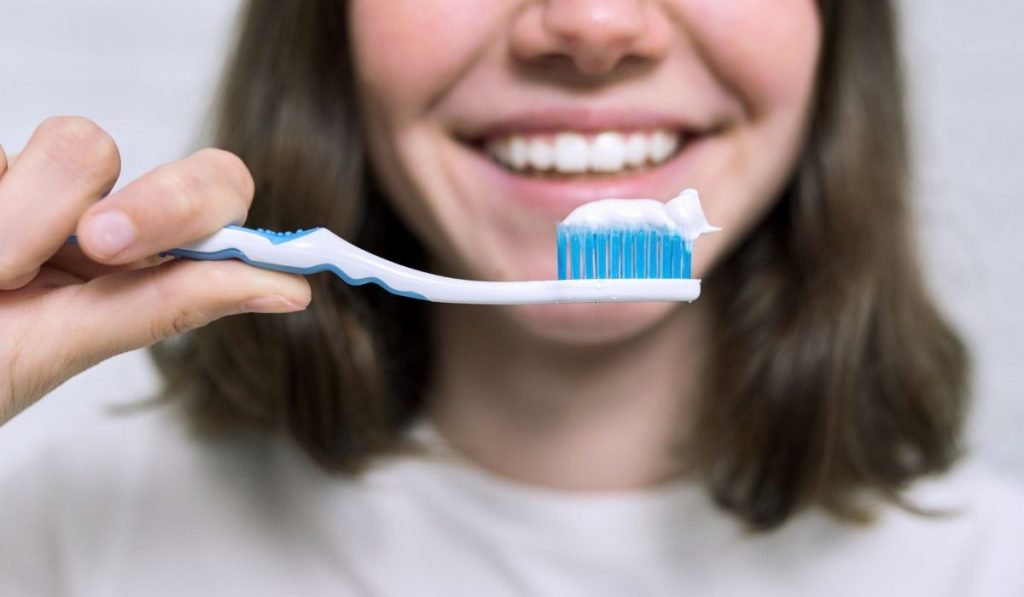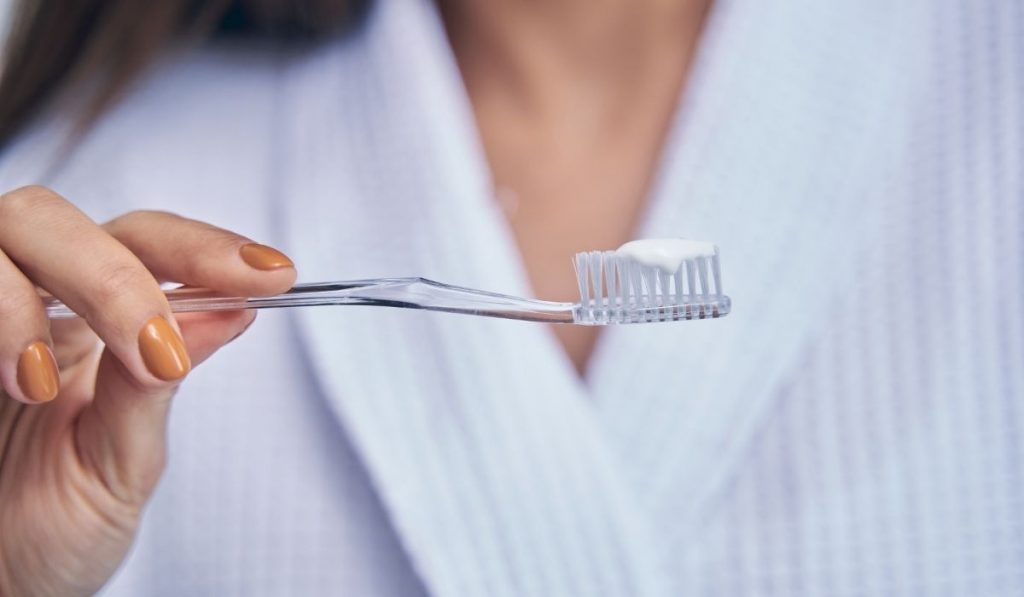Table of Contents
What is a Hydroxyapatite Toothpaste?
Hydroxyapatite (HAp) is a form of calcium found in teeth and bones. HAp constitutes about 97 percent of your tooth enamel, and about 70 percent of the dentin, while the remaining parts of the tooth are made up of collagen, proteins, water, and other minerals. A hydroxyapatite toothpaste, therefore, is a synthetic form of HAp incorporated into toothpaste.
Besides tooth enhancement, hydroxyapatite is widely used in osteopathic research as it makes up approximately 60 percent of bone material. HAp is used to strengthen bones and aids in restorative and preventative measures when dealing with fractured bones.
Its chemical formula is Ca5(PO4)3(OH) and is especially concentrated in the tooth enamels, the reason why teeth stand so strong despite constant acid attacks from food and drink.
The first recorded medical use of hydroxyapatite was in 1970 by NASA. The calcium strain was used to help strengthen the teeth and bones of the NASA astronauts who had just returned from the zero-gravity space environment and were experiencing major challenges with loss of teeth and bone mass. Hydroxyapatite was very helpful in repairing, strengthening, and re-mineralizing them.
Later during that decade, a Japanese firm, Sangi Co. Ltd, imported the idea from NASA and used hydroxyapatite in the mass production of enamel restoration toothpaste that is still sold to date.

Where is Hydroxyapatite Found?
Hydroxyapatite is very compatible with our bodies, the reason why it is actively prevalent in our medical, dental, and body applications. Hydroxyapatite is rich in remineralizing abilities which give room for regeneration and growth of bones tissues, and strengthening of tooth enamel.
Hydroxyapatite is actively found in such products as toothpaste, nutritional supplements, dental abrasives, and medical pastes and powders.
There is a range of treatments that use hydroxyapatite to enhance their efficacy, including tissue repair treatments, artificial teeth and bone treatments, protein binding agents for chromatography and bacteria culture treatments, and treatments for orthopedic implant coatings to improve biocompatibility.
Does Hydroxyapatite Work in Teeth Remineralization?
Yes, HAp toothpaste work in tooth demineralization.
First off, teeth are made up of three main layers, the outermost being the enamel, then a hard tissue called the dentin, and another hard tissue covering roots called the cementum. All three tissues are made of both organic and inorganic substances and a small amount of water.
The inorganic substances are made of calcium and phosphate ions, producing strong hydroxyapatite crystals that harden the teeth and enable them to withstand the forces and pressures of chewing, crunching, and grinding.
Therefore, as you live your daily life, your teeth are in a constant cycle of demineralization and remineralization.
So what are tooth demineralization and remineralization? Tooth demineralization is the process where a tooth loses its minerals as a result of oral bacteria that thrives off sugary food and drink remnants in the oral cavity, producing acids that wear and tear away at tooth enamel.
Tooth remineralization, on the other hand, is the tooth repair process. It is simply a process where the body works to repair and restore the tooth enamel surface and prevent further mineral loss and corrosion of the enamel.
One sure way that the enamel repair itself is when the small pores and cracks left behind are filled with saliva before they can get big enough to allow bacteria to enter through and maybe advance them into cavities.
There is a wide range of toothpaste and mouthwashes with hydroxyapatite and fluoride components that can help remineralize the teeth. Hydroxyapatite generally creates a barrier on the tooth surfaces that better protects the teeth from the acids and sugars that continue the process of demineralization.

What Does Hydroxyapatite Toothpaste Taste Like?
Depending on the brand of toothpaste you use, hydroxyapatite toothpaste has diverse tastes and may taste like just about anything. These tastes are subject to other ingredients used to make the toothpaste such as the essential beneficial oils, sweeteners like xylitol, and other crucial flavors.
Boka toothpaste, for example, uses traditional mint to add flavor to its toothpaste. Mint flavors are common in many kinds of toothpaste. For a different taste, RiseWell’s children’s toothpaste is spiced up with a vanilla birthday cake flavor, mainly to entice its target users.
How Does Hydroxyapatite Feel on Your Teeth?
Beyond what hydroxyapatite tastes like, the real difference between this toothpaste and conventional toothpaste comes in how the paste makes the teeth feel.
If you go through the product reviews of any hydroxyapatite toothpaste or ask any users, HAp toothpaste makes their teeth feel healthier, stronger, smoother, and less sensitive to hot and cold.
How Do You Use Hydroxyapatite Toothpaste?
Just like you would with any other toothpaste, squeeze a peanut size amount of the paste on your toothbrush and gently brush it on your teeth for two minutes.
However, to get the best remineralizing effects, avoid rinsing your mouth with water after brushing. This leaves the toothpaste stuck on the tooth enamel for much longer, helping to better remineralize them.
Does Hydroxyapatite Toothpaste Restore Enamel?
Although tooth enamel is arguably one of the hardest substances in the body, this doesn’t mean that it is not vulnerable to chips and fractures. The tooth enamel is known to gradually grow weak and chip away as a result of eating, aging, and injuries, just to mention a few of the possible causes.
Once the enamel has chipped off, it is not replaceable. However, through remineralization, the mineral content of the remaining enamel can be strengthened and reinforced. Therefore, using a toothpaste rich in hydroxyapatite ensures that you avail the enamel restoration component to the teeth, which helps them rebuild.
Hydroxyapatite toothpaste is essential in preventing demineralization of teeth through remineralization of the early signs of tooth cavities.
Hydroxyapatite toothpaste also promotes the remineralization process without having to put in the risks of too much toxicity associated with too much fluoride, as would be in other toothpaste.

Effects of Hydroxyapatite Toothpaste
It is important to find out all the information when looking to improve your oral health. Let’s have a detailed look.
Benefits of Hydroxyapatite Toothpaste
Antibacterial Properties
The presence of harmful bacteria in the mouth can lead to tooth decay if oral hygiene is not well observed and adhered to. Bacteria often work on traces of foods and drinks left in the mouth after eating, thereby releasing acids that start dissolving tooth enamels, making them prone to cavities.
Using hydroxyapatite toothpaste helps create a shield around the tooth enamels, making them bacteria-proof and resistant to dental plaque. The toothpaste also helps fill fissures and cracks on teeth, preventing bacteria from invading further into the teeth.
Food Waste Removal
Just as any other toothpaste would do, a hydroxyapatite toothpaste allows you to remove any and all food residues in the mouth that give an enabling environment for harmful oral bacteria to thrive.
Prevents and heals cavities
As aforementioned, hydroxyapatite helps improve the strength of the enamel and gets into cracks and fissures in teeth to aid in remineralization, effectively having reverse effects on possible cavities and tooth decay.
Furthermore, unlike other toothpastes with fluoride, a hydroxyapatite toothpaste will never have the risk of fluorosis, the more reason it should be the most recommended.
Decrease in Tooth Sensitivity
If you experience sharp tooth pain in response to either hot or cold foods, a hydroxyapatite toothpaste should work best for you because it helps build a stronger enamel that helps you better resist sensitivity to changes in temperature.
It is Non-Toxic and Biocompatible
Unlike fluoride toothpaste which can turn into neurotoxicants in high doses, hydroxyapatite toothpaste is biocompatible, meaning that it is readily accepted by the body as a substance that belongs in the body. However, neurotoxicants are toxic substances that affect the nervous system, like the brain.
This issue specifically affects kids who tend to use more toothpaste than the required amount. It even gets worse when referring to a toothpaste with a hundred times over the amount of fluoride present in water.

Good for Oral Microbiome
The use of hydroxyapatite toothpaste helps improve oral health by protecting your teeth from acid attacks due to bacteria while delicately balancing and not affecting the oral microbiome.
Many oral care brand products will often think that eradicating the oral microbiome is good for oral health, while it is not. A healthy mouth needs a healthy balance of bacteria in the oral cavity.
Unlike fluoride toothpaste which entirely kills bacteria in the mouth, hydroxyapatite toothpaste effectively defends your teeth without harming the oral microbiome.
Other agents like alcohols, triclosan, and chlorhexidine may temporarily keep in check the microbiome growth issues, but are not long-lasting and may lead to other oral health complications over time.
Resistant to Acidic PH
An acidic mouth is not good for perfect oral health first off, because the mouth would be susceptible to inflammations and oral disease, not to mention the definite fast decomposition of the enamel. A hydroxyapatite toothpaste helps maintain the oral pH at optimum levels.
Whitens Teeth
As we all know, toothpaste is a tooth polishing agent, and not all toothpaste may have teeth whitening agents, but they need to polish teeth. However, hydroxyapatite toothpaste has whitening agents that are not found in conventional toothpaste.
Therefore, prolonged use of HAp toothpaste will eventually have a whitening effect on your teeth. Even without the whitening agent, it will still brighten and whiten your teeth as it polishes and remineralizes them.
Although the hydroxyapatite toothpaste might not change the polishing properties of the paste, it imports a whitening capability otherwise not present in other toothpaste.
Improves Gum Health
For most patients with any form of gum disease, hydroxyapatite toothpaste is the most recommended solution. The HAp strengthens and improves the gum and dental health, subsequently improving conditions with plaque control, bleeding gums, or gum pocket depth.
Negative Effects of Hydroxyapatite Toothpaste
To date, there is no evidence of a likelihood that one may have any adverse effects from using toothpaste with hydroxyapatite. Furthermore, there may exist extremely rare cases of someone developing allergic reactions to hydroxyapatite.
Besides, studies have proven time and again that hydroxyapatite toothpaste is not likely to irritate either your mouth or teeth, and neither do they pose any safety threats.

Alternatives to Teeth Remineralization
Employment of hydroxyapatite and fluoride toothpaste is a sure way of teeth remineralization. However, there are other ways of beating tooth demineralization. These include:
- Decreasing sugar intake – less sugar intake means that oral bacteria will have less food to feed on.
- Stay hydrated – regular hydration helps rinse your mouth of bacteria besides facilitating the production of more saliva, all aiding in rinsing the mouth, especially if you can’t get hold of a toothbrush.
- Chew sugarless gum – sugarless gum contains xylitol, a type of sugar alcohol. This substance not only improves the flavor of the gum but also aids in the remineralization of teeth as well as prevents cavities.
- Break juice habits – if you love juices, lots of fruit juices like citrus have acidic properties that are corrosive to the teeth. If you must, drink them in moderation and brush your teeth shortly afterward.
- Take calcium supplements – the mere availability of calcium in the body will promote strong teeth and bones.
- Cut back on dairy products – dairy products contain lactose, a type of sugar that is most enabling for oral bacteria.
Risks of Letting Teeth Demineralize
If your teeth are demineralizing and you don’t take any action, you are running a risk of slowly corroding your enamel, thereby gradually weakening your teeth.
White spots forming on the teeth could also be a sign of a looming danger due to demineralization. Cavities may also come about due to the acids deposited on the teeth by microbes. Lastly, there is the risk of eventual tooth loss due to tooth decay.
Conclusion
If you are looking to maintain perfect oral hygiene, then hydroxyapatite toothpaste is the real deal. It is the most friendly and versatile toothpaste for your oral health. If you are skeptical about the toothpaste, you can always try another oral cleaner with hydroxyapatite like a mouth wash.
Resources
- https://www.healthline.com/health/dental-and-oral-health/hydroxyapatite-toothpaste#summary
- https://www.newmouth.com/blog/hydroxyapatite-toothpaste/
- https://eagleharbordentist.com/nano-hydroxyapatite-safe-for-family/
- https://askthedentist.com/hydroxyapatite-toothpaste/
- https://www.amazon.com/s?k=hydroxyapatite+toothpaste&correlationId
- https://www.nature.com/articles/s41405-019-0026-8
- https://www.ncbi.nlm.nih.gov/pmc/articles/PMC8432723/
